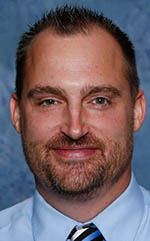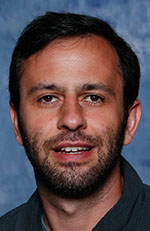By Rick Vacek
GCU News Bureau
The Ministry Forum at Grand Canyon University began in 2014 as a way for College of Theology students to hear the views of various professors at one time, but it quickly has grown into much more than that.
Monday night, it was standing-room-only for a discussion on "Who Leads the Church? A Definition of Church Policy," and Dr. Jason Hiles, the COT dean, couldn't have been more pleased.
"It's also an opportunity for us to develop community within the college, and then at some points we connect with local ministers," he said. "So there are a few different things that are going on here, but a lot of it is cultivating a fuller understanding of theology and a real sense of the larger body of Christ and the community of faith."
What made it work for the students Monday was watching four of their professors — some of whom they know well, some they probably have heard about — trade ideas on a provocative topic.
"When you get four professors on the hot seat, it's just fun," Hiles said. "The hour flew by. The crowd was engaged. The questions were fantastic."
The presentation was a panel discussion featuring Dr. John Frederick, a COT professor who also is manager of the Center for Worship Arts, and COT professors Margaret Koontz, Dr. Joshua Greever and Dr. Jeff Jibben. Frederick represented the Episcopalian (bishop-led) style of Protestant church leadership, Koontz spoke for Presbyterianism (presbytery-led), Jibben advocated Congregationalism with a single elder (smaller, independent churches) and Greever was for Congregationalism with a plurality of elders. Dr. Daniel Diffey was the discussion leader.
The first question was the obvious one: How should the church be governed?
Frederick pointed to early church writings and argued that every church needs a strong leader. "What I like about it most is that I have a pastor who pastors me," he said.
Koontz held up the Book of Confessions and the Book of Order and said, "We can hear God best in community."
Greever said, "It should be governed by a congregation as a whole and should be led by a plurality of elders."
Jibben referred to Acts 15:19, in which James is identified as the principal elder, and said the best model is one in which an elder oversees and a deacon serves.
The second discussion question was about the responsibilities of the overseer and the congregation.
Frederick produced the biggest laughs of the night when he delved into the reason churches face so many challenges: "Every church is messed up because there are people in there," he said, laughing along with the audience.
Koontz said the congregation becomes a community of faith, hope, love and witness, and it’s best when a group of elders works with a pastor.
Greever said an elder is like a shepherd, and the congregation should submit to the elders as long as they aren't leading the church into sin. The responsibility for this, he said, rests with the congregation as well as the elders.
Referring again to Acts 15, Jibben said he agreed with Greever: The elder needs to be an active listener, and the congregation needs to ensure that what is happening in the church conforms to the Gospel.
That was a good segue into the final question of the night, "What are the theological and practical implications of your view, and why does it matter?"
Frederick compared the church to a body. "If you remove yourself from the church," he said, "it is like ripping out a ligament from the body."
Koontz said the mission of the church is to bring the Gospel to the world, provide sacraments and nurture a covenant community.
Greever suggested that pastors most often fall into sin when they are working alone rather than in concert with the congregation, but the members of the congregation are responsible before God to keep the church on the right track.
Jibben said that 85 percent of the churches in the United States have fewer than 200 members, 67 percent have fewer than 100 and 33 percent have fewer than 50. In such small numbers, he said, church members must be vigilant.
Diffey wrapped up the discussion by urging students to "be the body of the church."
The College of Theology provides instruction for instructors across campus with its "Lunch and Learn" program, and students benefit from the Ministry Forum. Monday’s session worked well because panelists were limited to three minutes apiece in answering each question.
"I thought it was one of the better ones in terms of presentation and dynamics," Hiles said.
The next Lunch and Learn, “Work That Honors God,” is scheduled for 11:15 a.m. Friday, Jan. 22, in Howerton Hall. Tamara Wisely of the College of Nursing and Health Care Professions is the featured speaker.
The next Ministry Forum, scheduled for 5 p.m. Feb. 8 in Building 5, is titled, "Jesus' Church: Bread of Life or Opiate of the People?"
Contact Rick Vacek at (602) 639-8203 or [email protected].





































































